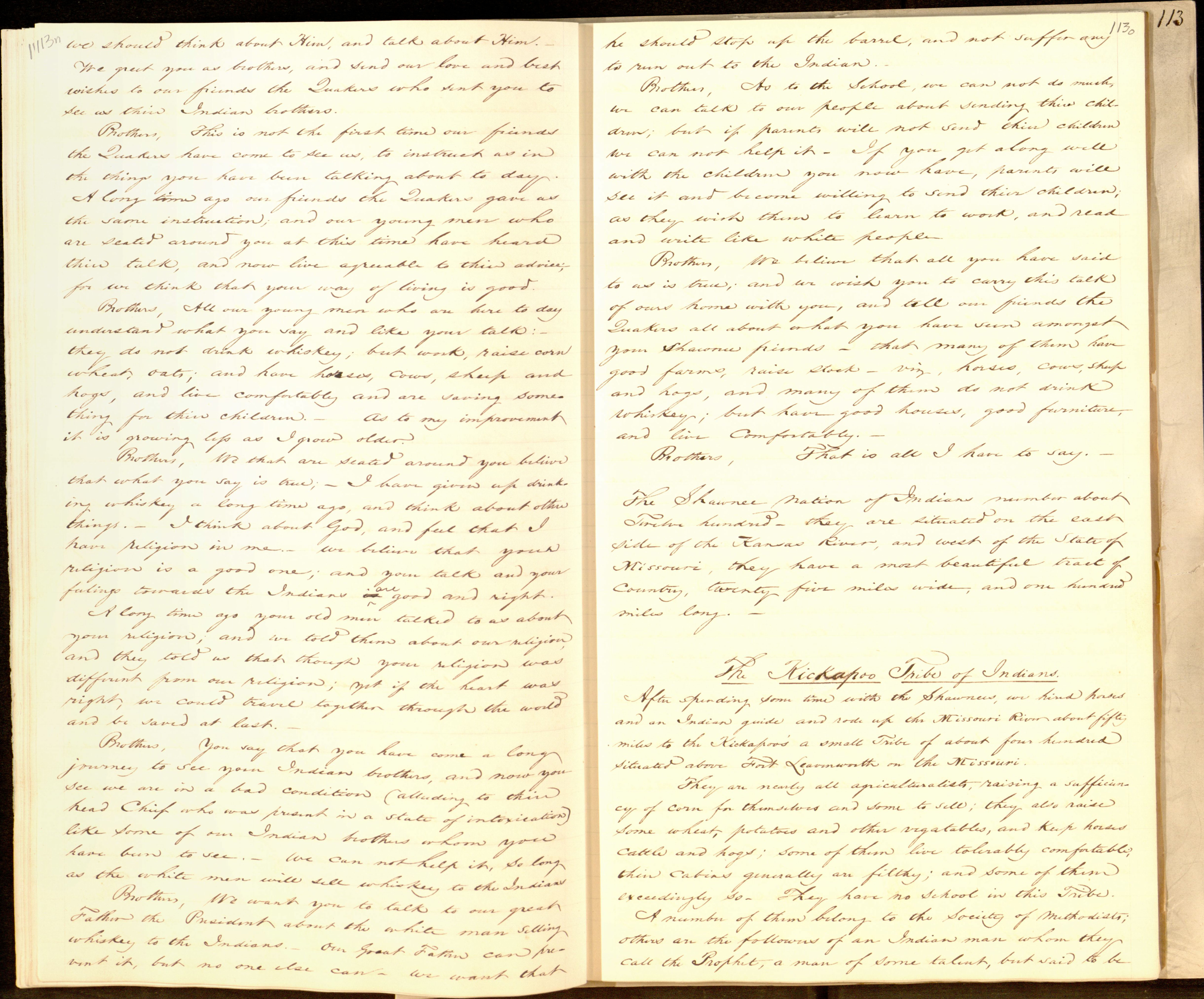we should think about Him, and talk about Him.
We greet you as brothers, and send our love and best
wishes to our friends the Quakers who sent you to
see us
their Indian brothers.
Brothers, This is not the first time our friends
the Quakers
have come to see us, to instruct us in
the things you have been
talking about to day.
A long time ago our friends the Quakers
gave us
the same instruction; and our young men who
are
seated around you at this time have heard
their talk, and now
live agreeable to their advice;
for we think that your way of
living is good.
Brothers, All our young men who are here to day
understand what
you say and like your talk:
they do not drink whiskey; but
work, raise corn
wheat, oats; and have horses, cows, sheep and
hogs, and live comfortably and are saving some-
thing for
their children. As to my improvement
it is growing less as I
grow older.
Brothers, We that are seated around you believe
that what you
say is true; I have given up drink-
ing whiskey a long time
ago, and think about other
things. I think about God, and feel
that I
have religion in me. We believe that your
religion
is a good one; and your talk and your
feelings towards the
Indians are good and right.
A long time ago your old men talked to us about
your religion;
and we told them about our religion,
and they told us that
though your religion was
different from our religion; yet if
the heart was
right, we could travel together through the world
and be saved at last.
Brothers, You say that you have come a long
journey to see your
Indian brothers, and now you
see we are in a bad condition
(alluding to their
head Chief who was present in a state of
intoxication)
like some of our Indian brothers whom you
have been to see. We can not help it, so long
as the white
men will sell whiskey to the Indians.
Brothers, We want you to talk to our great
Father the President
about the white man selling
whiskey to the Indians. Our Great
Father can pre-
vent it, but no one else can. We want that
he should stop up the barrel, and not suffer any
to
run out to the Indians.
Brothers, As to the School, we can not do much,
we can talk to
our people about sending their chil-
den; but if parents will
not send their children
we can not help it. If you get along
well
with the children you now have, parents will
see it
and become willing to send their children;
as they wish them to
learn to work, and read
and write like white people.
Brothers, We believe that all you have said
to us is true; and
we wish you to carry this talk
of ours home with you, and tell
our friends the
Quakers all about what you have seen amongst
your Shawnee
good farms, raise stock--viz, horses, cows, sheep
and hogs, and many of them do not drink
whiskey; but have good houses, good furniture,
and live comfortably.
Brothers, That is all I have to say.
The Shawnee
Twelve hundred--they are situated on the east
side of the Kansas River
Missouri
Country, twenty five miles wide, and one hundred
miles long.
The Kickapoo
After spending some time with the Shawnees
and an Indian guide and rode up the Missouri River
miles to the Kickapoo
situated above Fort Leavenworth
They are nearly all agriculturalists, raising a sufficien-
cy of corn for
themselves and some to sell; they also raise
some wheat, potatoes and other
vegetables, and keep horses
cattle and hogs; some of them live tolerably
comfortable;
their cabins generally are filthy; and some of them
exceedingly so. They have no school in this Tribe.
A number of them
belong to the Society of Methodists
others are the followers of an Indian man whom they
call the Prophet, a man of some talent, but said to be

